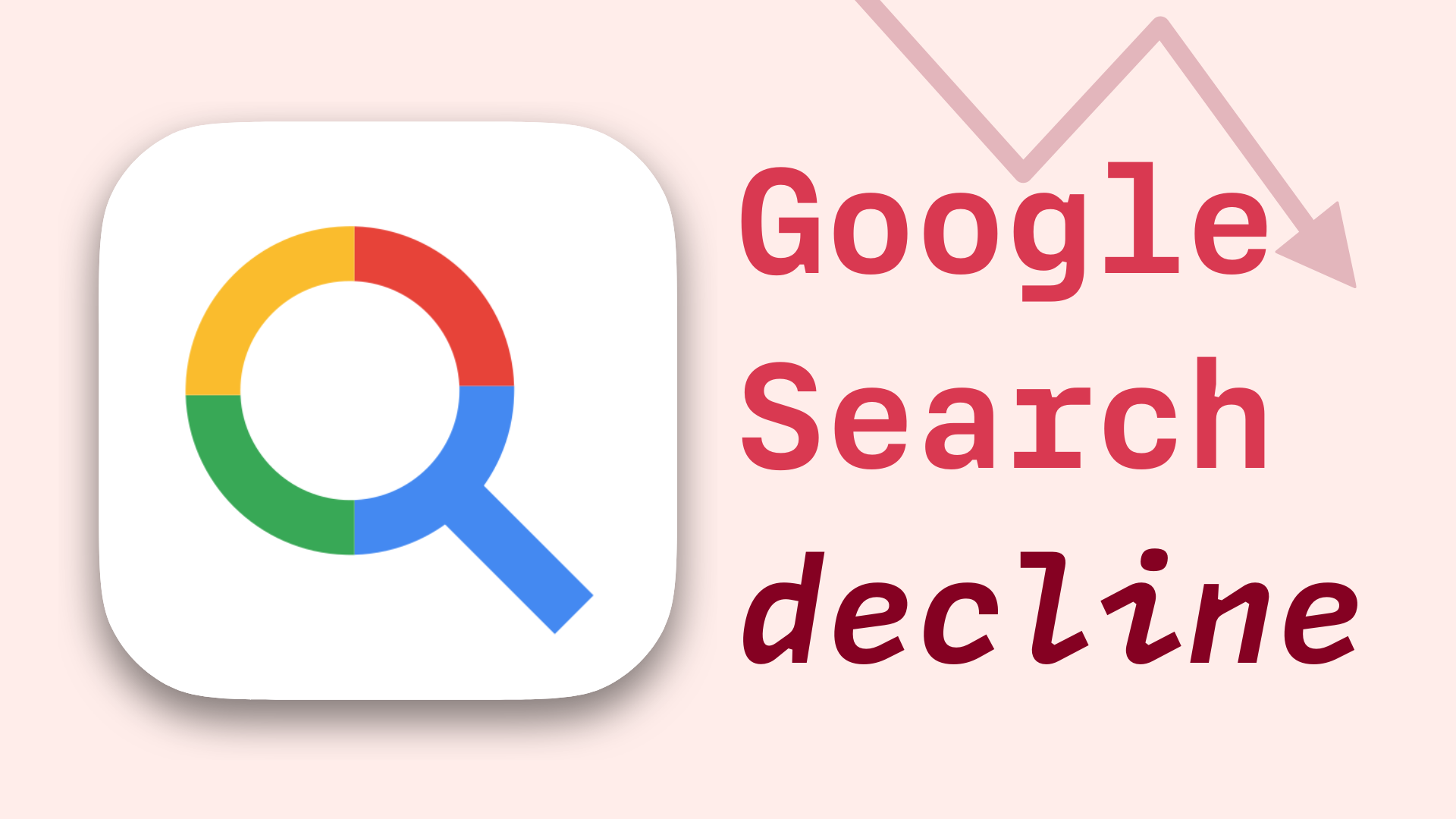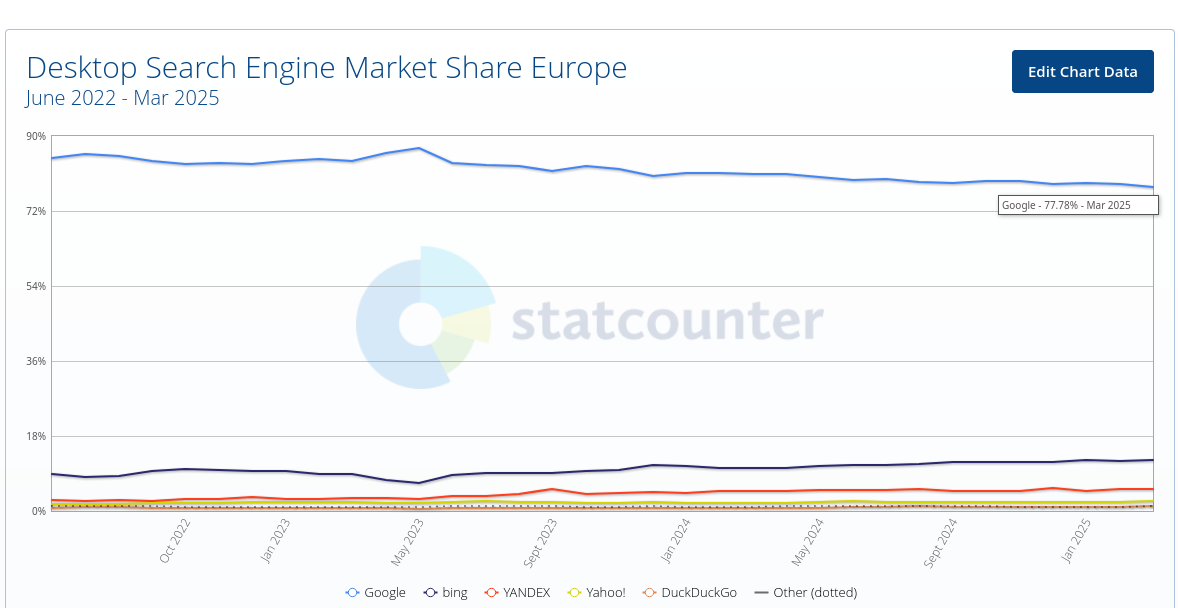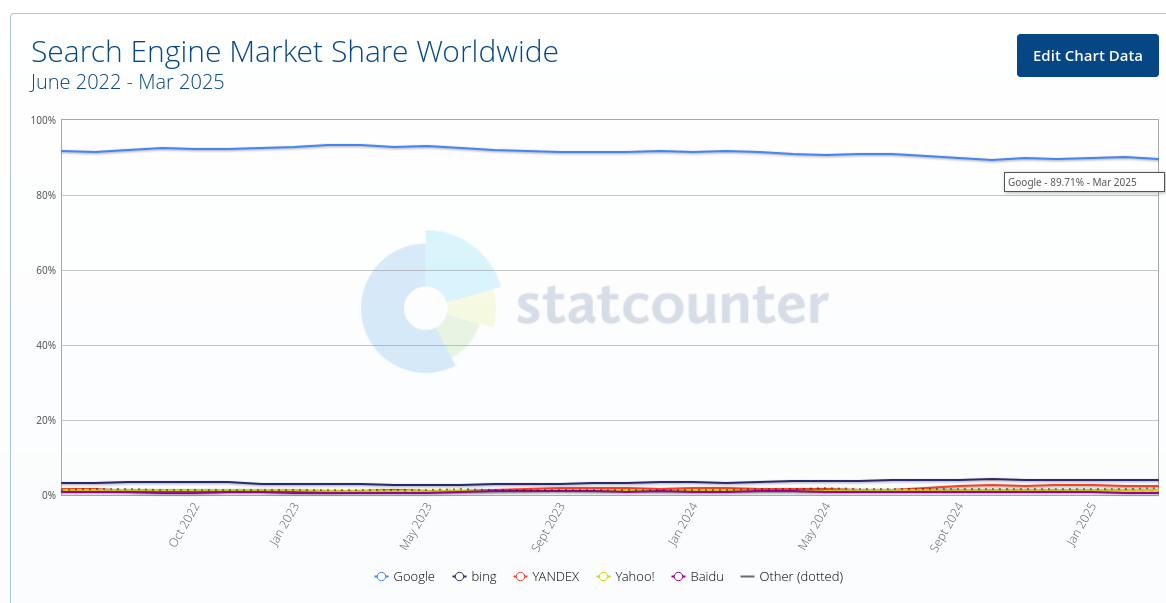Google’s dominance on search is declining – for the first time ever!
Google’s market share on search is below 90% - a sign that its dominance is ending?
According to Statcounter, Google’s share of global search traffic fell to 89.71% in March 2025 – a downward trend that started in October 2024. This marks the first sustained drop below 90% in nearly ten years. The last time Google saw similar numbers was in early 2015.
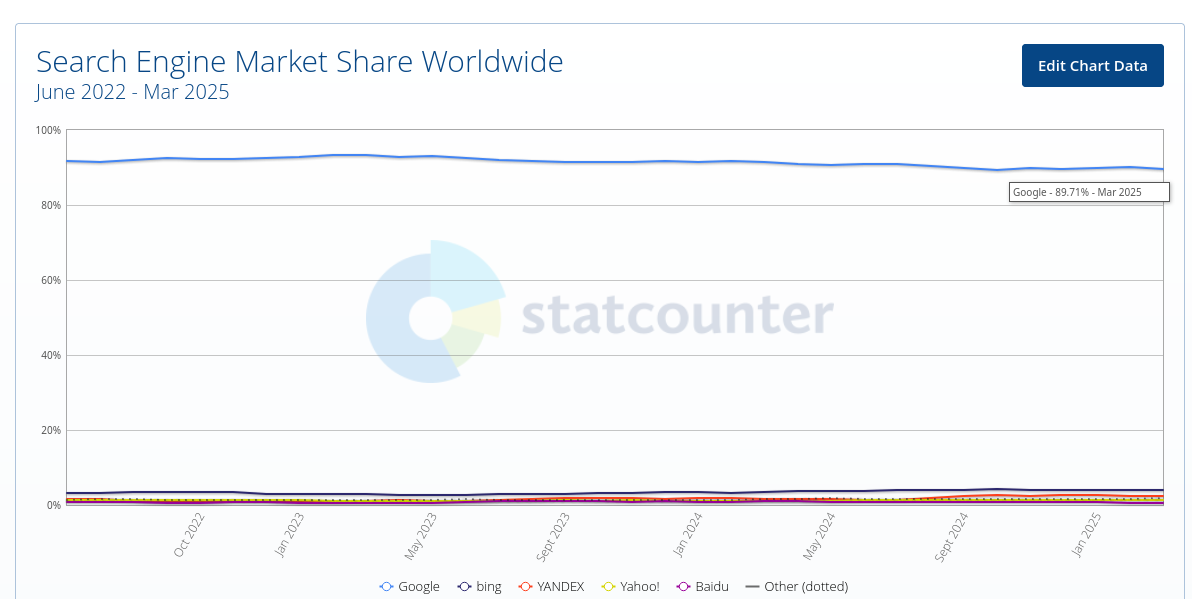

Search engine market share worldwide: Google drops below 90% market share in 2025.
On desktop, the change is even more dramatic. Here Google Search has seen a decline from its peak of 87.65% in May 2023 to an all-time low of 79.1% in March 2025. Looking at Europe, the decline gets even worse for Google moving from 87.08% in May 2023 to 77.78% in March 2025.
These numbers underline the current trend to choose European services instead of American ones, which followed the trend to deGoogle.
Desktop search engine market share Europe and worldwide: Google drops below 80% market share in 2025.
Why the decline matters
Some might now say “a 1% decline that’s nothing”. But if you break it down to actual numbers of users, this shift is dramatic. According to Statista, 5.56 billion people use the Internet. If we estimate that 5 billion of these also use search engines, the calculation goes as follows: 1% of 5 billion is 50 million. In recent months, 50 million people actively chose not to use Google Search anymore.
The data from recent months also suggests that this is not a one-time anomaly. It could very well be the beginning of a larger shift in user behavior as more and more people are increasingly concerned over privacy, monopolistic control, and data exploitation.
It’s also interesting to see who benefits from this shift. While other known search engines like Bing profit mostly, also up-and-coming privacy-first search engines report an enormous growth. For instance, Ecosia from Germany reports a growth of 250% since the end of 2024.
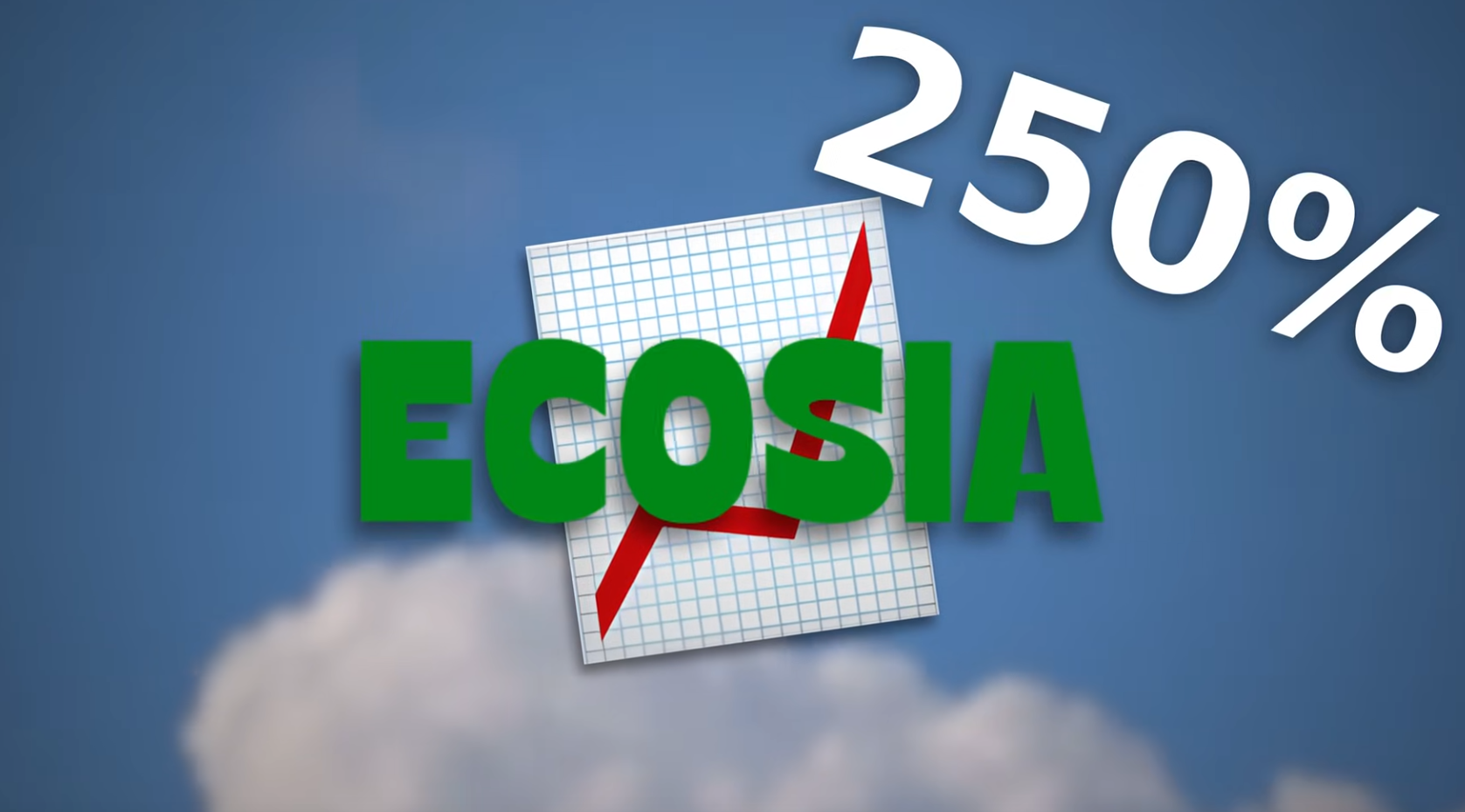

Ecosia from Germany (YouTube link) reports a growth of 250%.
We at Tuta welcome this change. The more people switch to Big Tech alternatives, the better for our free and diversified internet. That’s what we at Tuta stand and regularly fight for; for instance when filing a DMA complaint against Apple so that we can offer the Tuta app as a default mail option on iOS or when promoting alternatives to WhatsApp because Meta does not allow you to disable its new AI bot.
We expect that this is only the beginning and that more and more people will wake up and understand that the dominance of Big Tech is a problem and that it can only be solved by choosing alternative services.
Tuta’s 2024 downranking by Google Search
While Google’s influence is often discussed in abstract terms, we’ve experienced its power firsthand.
In March 2024, Google deliberately deranked Tuta in its search results for over three months. Without warning or explanation, our secure email service - a privacy-first alternative to Gmail - virtually disappeared from Google search, except for brand related search terms such as Tuta or Tutanota. Visibility of Tuta on Google Search dropped dramatically, and as a result our business was harmed significantly.
We weren’t alone. Other privacy-focused services, independent developers, and startups have reported similar issues with Google Search in the past. What these cases show is that Google’s control over search is monopolistic. With its power, Google decides who gets to be noticed on the web and who doesn’t.
When one company can quietly make another disappear from the internet’s primary discovery tool, that’s not a free market. That’s a Google monopoly. What is more, three months later – after we made the issue public and filed a complaint based on the European Digital Markets Act (DMA) – the ranking of the Tuta website got mysteriously restored. Even though we tried to get in touch with Google representatives, we’ve never heard back from them as to why all of this happened.
That’s why we at Tuta welcome the fact that Google’s monopoly on search might finally come to an end.
Legal pressure is growing
Fortunately, regulators are beginning to take notice, and this might also be another cause for the recent changes. In 2024, a U.S. federal judge ruled that Google had violated antitrust laws, calling the company a “monopolist” that abused its monopolistic position. The judge called the practice of Google paying other companies like Apple and Mozilla for placing Google Search as the default in Safari and Firefox browsers illegal – as it harms competition and unfairly protects Google’s market dominance in search. It put an end to this practice so that Google Search is no longer the default search engine on all major browsers. In addition, the EU forced Apple to give users the option to choose the default browser on iOS so that it’s no longer Safari (with Google Search) on all Apple devices.
More lawsuits are currently taking place – also in regard to other Big Tech companies like the recent fine of €700 million issued by the EU Commission to Apple and Meta based on the DMA. These cases show that large companies like Google are increasingly under scrutiny as their gatekeeping position is seen as a hindrance for a free and open web – and fair competition.
What’s next?
Google’s business model is built around surveillance capitalism. The more data Google collects, the more precisely it can profile users, and the more money it makes from displaying targeted advertisements to these users. Search is at the center of Google’s business model, which is also why the company fought so hard for its dominance here.
A decline in Google’s dominance will not only bring about more competition, it will also help all of us to build a better web – one where your privacy is being respected.
Now is the perfect opportunity for users to turn to alternative services that don’t rely on tracking to show that they’re rejecting a system that sees them as the product.
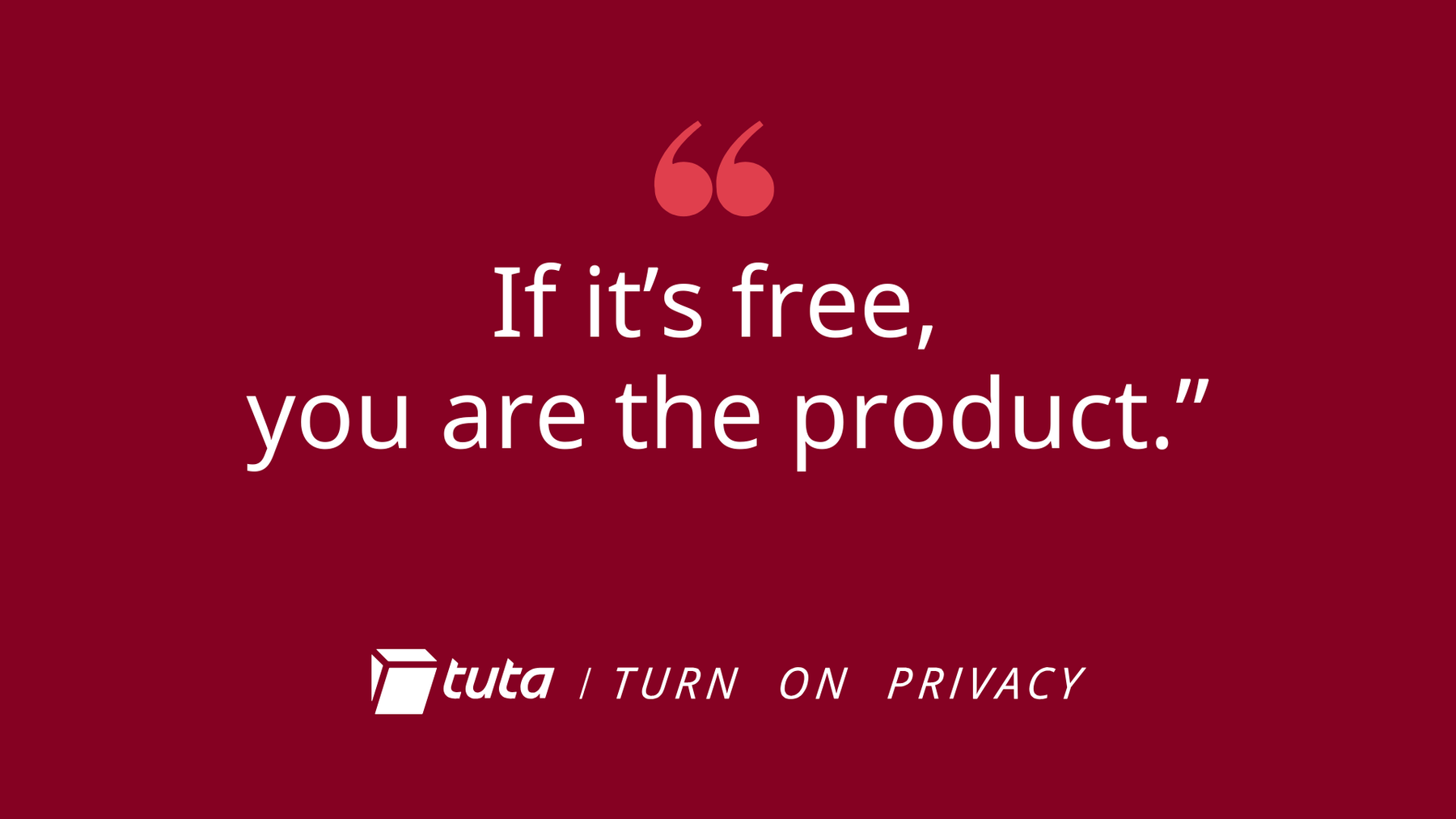

This is why Tuta exists. We’re building a future where privacy isn’t abused, instead it’s the default. With end-to-end encryption, no tracking, no ads, and now quantum-safe encryption, we’re proving that it’s possible to offer secure and free services without exploiting personal data.
While Google’s share in the search market is still massive, the cracks are showing - and hopefully they will grow wider. As users become more aware of how their data is being used and abused by Big Tech, more people will look for tools that respect their right to privacy.
We’re already seeing this happen in search, email, messaging, and cloud storage. Momentum is building - and not just from tech-savvy users. The drop of Google’s search monopoly - even by only one per cent - is just the beginning, because this one per cent actually equals 50 million people who are consciously saying “No” to Google and its intrusive tracking.

